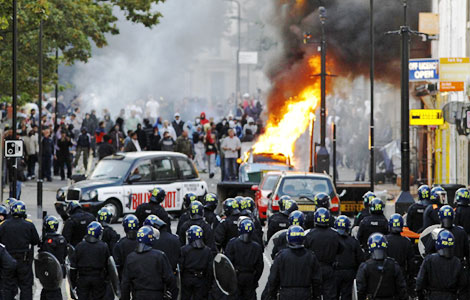Iraq still mired in violence
Updated: 2011-08-19 07:57
(China Daily)
|
|||||||||||
Synchronized explosions in Iraq on Monday killed at least 89 people and wounded more than 300, shattering what had been up until then a relatively peaceful Ramadan.
The wide-ranging attacks that included suicide bombers, car bombs and roadside bombs, targeted Sunnis and Shiites, civilians and security personnel all across the country.
Though no group immediately claimed responsibility for the attacks, Al-Qaida affiliates were blamed for the carnage. The wave of deadly bomb blasts, which was the worst in Iraq this year, demonstrated a resurgent extremist threat despite repeated crackdowns by Iraqi and US forces. In the first five months of this year, some 20 suicide attacks have taken place.
The attacks also prompted concerns over the projected US troop withdrawal. The Iraqi government had just agreed to formally negotiate with the United States about extending its troop presence for training beyond the year-end withdrawal deadline. About 47,000 US troops remain in the country after US combat troops pulled out last year.
The volatile situation presents the Iraqi authority and the US forces with a serious dilemma. As occupiers, any extension of the US military presence will lead to more attacks from anti-American groups, while the withdrawal of US troops will undoubtedly test the competency of the Iraqi government and security apparatus to deal with the insurgency.
Since the US invaded Iraq, the country has been a breeding ground for extremist groups. Al-Qaida terrorists and religious factions are trying to disrupt the internal political process and make Iraq a battlefield to attack the Americans as well as the Iraqi government institutions.
The stated US goal in Iraq was "to establish a stable democratic state capable of defending itself and holding itself together and overcoming insurgent attacks and internal divisions". Now, after eight years of military occupation, hundreds of billions of dollars and tens of thousands of lives, the US' failure to establish this goal is clear for all to see. And it is Iraqi civilians that have paid the heaviest price for this failure, with more than 100,000 violent deaths.
After eight long years of regime change and US occupation, Iraq is not a beacon of freedom and prosperity, lighting the way for other Arab countries, and the prospect of peace and prosperity is still nowhere to been seen.
While the US, as President Obama proclaimed last September, is ready "to turn the page" and leave others to clear up the mess it has made, it is not so simple for ordinary Iraqi people who are left to wonder when they will be able to get on with their lives in peace.
(China Daily 08/19/2011 page8)




